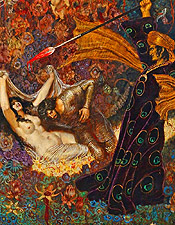Parsifal
, translated by Dyer, Abigail (dyerabigail@gmail.com)
Parsifal, composed by Richard Wagner, is a Romantic opera in three acts that combines elements from the 13th-century Middle High German romance “Parzival” by Wolfram von Eschenbach and the Old French “Perceval ou le Conte du Graal” by Chrétien de Troyes. Conceived in 1857 and premiered at Bayreuth Festspielhaus in 1882, Parsifal recounts the spiritual quest of the Arthurian knight, Parsifal (Percival), to retrieve the Holy Grail and heal the wounded King Amfortas.
Wagner's libretto integrates themes of self-renunciation, compassion, and spiritual enlightenment, influenced by Schopenhauer's philosophy and Indian religious concepts. The work's spiritual and philosophical underpinnings are conveyed through its innovative use of leitmotifs and chromaticism, accompanied by significant orchestral and vocal demands.
Parsifal's journey is marked by resisting seduction, banishing dark sorcery, and ultimately restoring the Grail's sanctity. The opera remained exclusive to Bayreuth until 1903, reflecting Wagner's intent to preserve its sanctity. Its post-war interpretations, especially those by Wieland Wagner, marked a shift towards minimalist staging, highlighting the music's spiritual and emotional depth.
Despite controversies surrounding its perceived religious and racial themes, Parsifal remains a seminal work in the operatic canon.

Dyer, Abigail
Support Open-Access:
Your contribution keeps our classical translations available to all. Every dollar helps support classics education and funds the expansion of our catalogue. Value what we do? Donate now.
File Downloads:
© Copyright, All Rights Reserved. This work may be freely reproduced, stored and transmitted, electronically or otherwise, for any non-commercial purpose. Conditions and Exceptions apply.